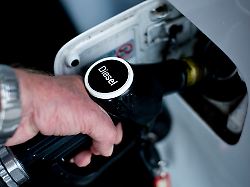Accusation of high fuel prices
Cartel Office takes petrol stations out of the line of fire
08/17/2023 1:43 p.m
While there were signs of relaxation on the German fuel market in the spring, petrol prices have been rising steadily since July. However, according to the Bundeskartellamt, the responsibility does not lie with the pump operators. The reason lies elsewhere.
The Bundeskartellamt has refuted allegations of price gouging at the petrol pumps. The prices for diesel and the gasoline types E5 and E10 are “currently very high,” said the authority. They have been increasing steadily since mid-July. But “the reasons for the price increases for diesel are not to be found at the gas stations,” said the President of the Cartel Office, Andreas Mundt. The increase in the price of crude oil is therefore primarily responsible for the price of petrol.
The cartel office examined the price development between July 1st and August 14th. The average price for the E5 rose from 1.85 euros to 1.92 euros per liter, for the E10 from 1.79 euros to 1.86 euros and for diesel from 1.61 to 1.78 euros. In the case of petrol, the gap between the average price and the price of crude oil has remained almost constant, the Cartel Office explained.
“After deducting taxes, the current price increases for E5 and E10 largely follow the development of the price of crude oil. Since July, we have recorded price increases of almost 14 percent for crude oil, partly due to cuts in supply in the supplier countries,” explained Mundt.
High procurement costs
In the case of diesel, on the other hand, the gap grew significantly. Mundt explained: “Since the Russia embargo, Germany has been opening up new supply routes for diesel as an importing country, but is in global competition with other buyers. This can result in greater price fluctuations. If other locations offer higher prices, more deliveries are made there.”
In addition, there are currently technical problems and capacity bottlenecks in local refineries. The current price increases are already taking place at the refinery and import levels. “But this means that the larger gap between diesel and crude oil tends not to benefit the filling stations, since they also have higher procurement costs.” Of course, that doesn’t do much for the driver’s wallet, Mundt conceded. He advised once again: “Use the apps with the price data from our market transparency office. Compare gas stations.”
